Iran Security Body Says 200 People Killed In Ongoing Protests
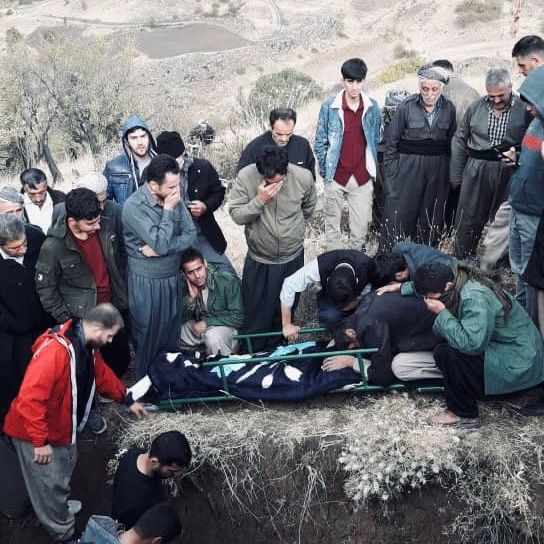
An Iranian state security body says over 200 people have lost their lives during the protests following the death of Mahsa Amini in mid-September.

An Iranian state security body says over 200 people have lost their lives during the protests following the death of Mahsa Amini in mid-September.
In a statement on Saturday, the country’s Security Council said over two hundred people were killed during nationwide “riots”, a figure significantly lower than what human rights groups have released.
The judiciary's Mizan news agency quoted the interior ministry’s state security council as saying that security forces, people killed in terrorist acts, “rioters” and armed members of separatist groups have been among the dead.
However, the interior ministry has not acknowledged that regime forces have killed dozens of civilians using live rounds and direct fire.
The body has also warned the protesters that any illegal gathering would be dealt with decisively. This comes as according to the Oslo-based Iran Human Rights Organization at least 448 people including 60 children and 29 women have been killed by security forces in the ongoing nationwide protests.
The US-based Human Rights Activists News Agency (HRANA) announced in its latest report that at least 469 protestors have been killed, of which at least 64 were minors.
An Iranian Revolutionary Guard commander November 29 put the number of dead at three hundred in a contradiction with the numbers released by the interior ministry.
Iran blames “enemies” for the civil unrest, pointing at the United States, other Western powers, and Israel.

Top Iranian officials appear to perceive or pretend to perceive the ongoing protests in Iran as an outcome of what they call a "media war" against the regime.
From the start of popular protests in mid-September, Iran’s ruler Ali Khamenei and his top officials began blaming foreigners for the unrest, mostly ignoring the root causes of deeply felt public anger.
In one of the most recent comments in this regard, Iranian Army Commander General Abdolrahim Mousavi charged that "The enemies are waging a war on the Islamic Republic using audio, video and written words."He claimed that "the enemies are targeting the status of the Supreme Leader and the Islamic Republic's values."
Earlier, IRGC Commander Hossein Salami had also expressed his anger against the media coverage of the ongoing uprising and threatened foreign-based Persian broadcasters such as Iran International and BBC Persian. The satellite TV programs beamed by these independent media have become even more popular during the crisis for a public that is bombarded by one-sided government outlets.
The persistent accusations and threats against independent media reached a point that in early November London’s Metropolitan Police warned Iran International about serious terror threats against some of its journalists and positioned tight security around its headquarters.
Meanwhile, Iranian lawmaker Jalal Rashido Kochi told Didban Iran website on December 1, that "foreign-based media that operate against the Islamic Republic have become extremely powerful," however, he blamed state television, the Islamic Republic of Iran Broadcasting (IRIB)'s weakness for Iranian's trust in foreign-based media. He said Iranians should not trust the videos they watch on foreign-based televisions.
"Foreign-based media are aware that Iranians are not happy about their financial situation and the country's economic crisis, and they use this situation to fan opposition to the Iranian government," Kochi argued and added that the media scene has changed in recent years, and we can no longer convince the audiences to use an exclusive government-owned news source." Kochi was referring implicitly to the state TV's exclusive right to broadcast in Iran.
Following a decade of extreme censorship and sheer propaganda after the 1979 revolution, Iran allowed minimal openness on the state radio and TV in the early 1990s and dozens of reformist newspapers brought a breeze of media freedom in the late 1990s, but hardliners around Khamenei shut down all reformist papers, jailed proreform journalist and returned hardline fundamentalism to radio and television. In recent years, following the emergence and popularity of social media the government exerted pressures to ban nearly all social media platforms in Iran.
In an interview on Etemad Online, Hossein Nourani Nejad, the spokesman for the reformist party, said this week that "There is no hope in reforming the state television and media outlets aligned with military and security institutions." He was referring to publications such as the IRGC mouthpiece Javan, and other dailies such as Kayhan, Vatan Emrooz, Hamshahri, Fahikhtegan, Jam-e Jam, Hemayat and so on as well as IRGC-affiliated news agencies Fars and Tasnim and two dozen news websites linked to security organizations.
Nourani Nejad added that these media outlets basically produce news and current affairs stories to cater to the taste of a minority, presumably meaning the regime loyalists.
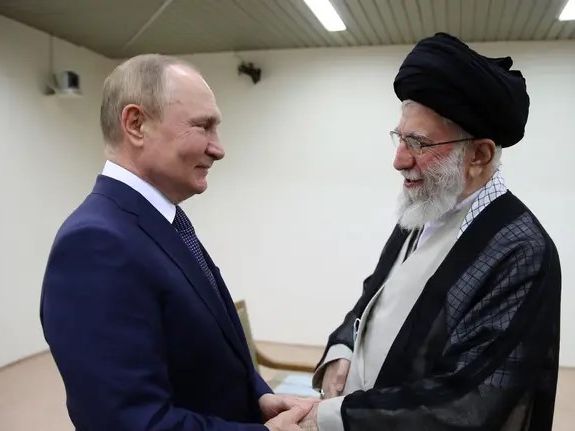
The Islamic Republic has asked Russia for help to quell the popular uprising by supplying anti-riot equipment and training, Iran International has learned.
The Iranian regime has asked Moscow to dispatch advisors as it is preparing for a long-term confrontation with protesters and concerned about its limited resources both in manpower and equipment.
Secret files recently obtained by hackers and shared with Iran International also shows that Tehran is relying on information from Moscow to assess its own internal situation. There are references in the documents that Russia is eavesdropping on Western communications to give Tehran assessments about the nature and strength of the protest movement.
The new information about Tehran asking Moscow’s help confirmed remarks late in October by the White House that Russia may be advising Tehran on optimal methods to suppress the ongoing protests.
White House press secretary Karine Jean-Pierre said during a joint press briefing with Coordinator for Strategic Communications at the National Security Council in the White House John Kirby that Moscow may be helping the Islamic Republic, drawing on its own experience in suppressing demonstrations.
"The evidence that Iran is helping Russia rage its war against Ukraine is clear and it is public. Iran and Russia are growing closer the more isolated they become," Jean-Pierre said. "Our message to Iran is very, very clear: Stop killing your people and stop sending weapons to Russia to kill Ukrainians."

Kirby said that the White House is certain about Russia’s help in the crackdown on protesters, adding that it is not an allegation but a fact. “We know they may be considering some sort of support to Iran’s ability to crack down on protesters. And sadly, Russia has experience at doing that,” he said.
Kirby called it “just yet another example of Russia and Iran now working together to violate the — not only the human rights and civil rights of people in Iran but, of course, put in further danger the lives of Ukrainians.”
The growing outcry against Iran’s brutal crackdown on anti-government protests ignited by the beating to death of Mahsa Amini that has led to about 470 other killings has now been magnified by the Islamic Republic’s tilt toward Russia and arms support for its invasion of Ukraine.
It has already caused a policy shift in Washington as the Biden administration has said that the revival of the 2015 Joint Comprehensive Plan of Action (JCPOA) is not a priority at present and that the US focus is on the protests in Iran. US Special Envoy for Iran Robert Malley said earlier in the week that President Joe Biden is prepared for a military option to prevent Iran from acquiring a nuclear weapon in case sanctions and diplomacy fail.
A senior Revolutionary Guard commander Saturday told Iran International that the IRGC's chief commanders have called up 1,000 retired members to help quell the popular uprising as they don't have enough forces, but only 300 accepted to return to service and crack down on protests.
Earlier in the week, an audio file obtained by the hacktivist group, Black Reward, revealed concerns among Iranian officials about their worn-out security forces, media failures and labor strikes.
Black Reward found access to Fars News Agency’s data servers in recent days providing Iran International with an audio tape of a meeting between a Revolutionary Guard general and a group of media managers or representatives from outfits affiliated with the IRGC.
About 18,000 people have been arrested since the beginning of the protests, and some death sentences have already been issued for the protesters, though none have been carried out. According to Norway-based HRANA on December 2, 469 protestors and 61 members of the security forces have been killed in protests since September 17.

Friday protests in Iran were mainly focused on the mourning ceremonies for people killed during 75 days of unrest, with Bandar Anzali, Arak, and Izeh being the hotspots of the rallies.
One of the mourning gatherings was for Mehran Samak, a 27-year-old resident of Bandar Anzali in the northern province of Gilan, who died in hospital after being shot in the head with a bullet this week while he was celebrating after the Iranian soccer team’s loss against the US in the World Cup. Many Iranians wanted their team to lose because players had not shown support for antigovernment protests.
But once people crowded the streets after the football match ended in Qatar, security forces opened fire at cars that were honking as a sign of celebration, hitting Samak and many others. The government was ready to celebrate a win against the US team and security forces who had been prepared to wave flags and distribute sweets to people, were in no mood to see protesters expressing happiness for Iran’s loss.
Hours before Samak’s mourning gathering Friday, security forces had blocked the roads leading to the designated location. However, the protesters attended the mourning ceremony for the third day after his death, chanting "We will fight, we will die, we will take back Iran..."
In the city of Arak, people gathered for the 40th day anniversary of the death of Sina Malayeri, chanting slogans such as “Poverty, corruption and high prices, we are going to overthrow the government."
They chanted, "Death to Khamenei" and "This year is the year of the blood, Ali Khamenei is downed.”
Malayeri was reportedly killed by security forces and his body was found in a workshop near his place of residence, but the city’s prosecutor claimed that he died due to a drag overdose.
In the city of Izeh in the oil-rich Khuzestan province, people held gatherings in honor of Hamed Slahshour, a protester whose body was buried in a graveyard near the city by the security forces. His body was exhumed by his family members and re-buried in the family’s plot, but did not manage to do so under pressure of the security forces. The Iranian Human Rights Center reported that the 22-year-old was killed under torture after his arrest.
The mourning protest gatherings came on the backdrop of widespread rallies in the Baluch-majority cities across Sistan-Baluchistan province as the government has killed nearly a hundred people in the impoverished region since September 30. Protesters marched after Friday prayers particularly to voice support for their religious leader Mowlavi Abdolhamid.
The popular protests demanding an end to Islamic rule started in mid-September when 22-year-old Mahsa Amini was killed in the custody of the so-called “morality police,” igniting the boldest protest movement against the Islamic Republic in its 43-year history.
About 18,000 people have been arrested since the beginning of the protests, and some death sentences have already been issued for the protesters, though none have been carried out. According to Norway-based HRANA on December 2, 469 protestors and 61 members of the security forces have been killed in protests since September 17.
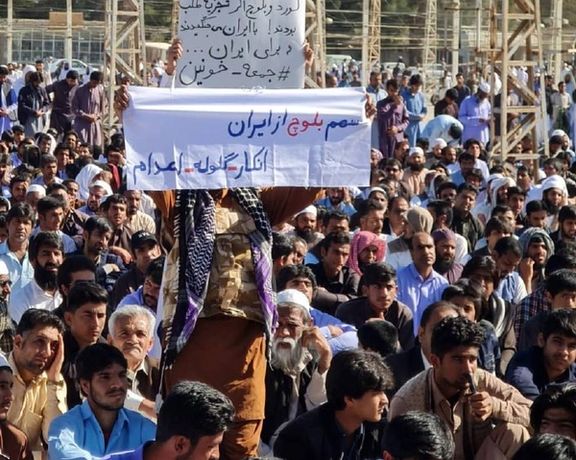
People turned out in large numbers in Iran’s Sunni city of Zahedan Friday to show support for their religious leader Mowlavi Abdolhamid who has been defying the regime.
Residents of several cities Sistan-Baluchistan Province, including its capital Zahedan, held demonstrations after Friday prayers as they have done since unrest began in mid-September in Iran. The protesters are especially enraged over a recently leaked document that revealed Supreme Leader Ali Khamenei has ordered his officials to defame Abdolhamid, the most prominent religious leader of Iran's largely Sunni Baluch population living in the province.
Earlier this week the hacktivist group Black Reward breached the data servers of Fars news agency, affiliated with the Islamic Republic's Revolutionary Guard, and released several documents indicating that Khamenei is dismayed by Abdolhamid’s remarks, who has been critical of Iran’s autocrat for the indiscriminate crackdown on protests in the province and elsewhere.
Relations between Abdolhamid and the government became tense after security forces opened fire on demonstrators in Zahedan September 30, killing more than 80 people.
In addition to Zahedan on Friday, protesters in Chabahar, Khash, Iranshahr, and Zahak, chanted slogans such as "Sheikh-ul-Islam (Abdolahamid) is with God, Khamenei is disgraced,” “Salute to Mowlavi, Death to Khamenei,” and “With Hijab or without hijab, moving towards revolution.”
According to videos posted on social media, security forces clashed with protesters in Zahedan and used teargas to disperse the gathering.
During his Friday prayer sermon earlier in the day, Abdolhamid decried the torture of detained protesters and warned the Islamic Republic against issuing verdicts that call protesters mohareb (muharib), which means warrior in Arabic. In Iran’s Islamic law the term means ‘enemy of God’ which carries the death penalty.
"A prisoner is a captive. Beating, insulting, cursing and assaulting him is against the teachings of Imam Ali (the first Shiite imam), Ahl al-Bayt (the family of Islam’s Prophet Muhammad), Hazrat Rasool (Prophet Muhammad) and Islam. The dissidents and critics should be treated in an Islamic manner,” he emphasized.
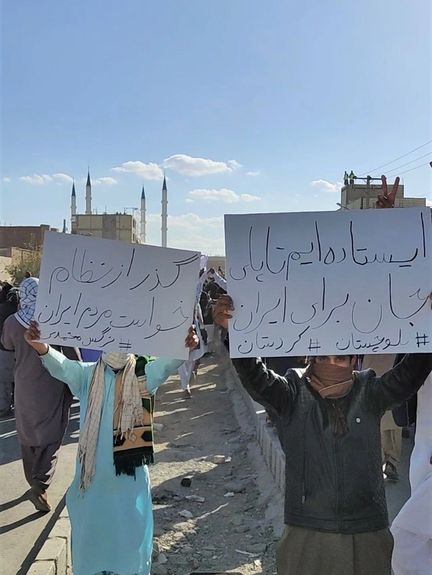
Abdolhamid went on to say that the nation has endured problems for 44 years, now they are protesting, insisting that their protests should not be a pretext to execute them. He said that their demands are legitimate, adding, "We want our country to be safe and united. We don't have Shiites, Sunnis or ethnic groups here. We are all Iranians. From Zoroastrians and Dervishes to Baha’is. They are also human and Iranian, and their rights should be respected…If an American or an Israeli speaks the truth, it is still the truth," he said.
Dervishes of the Gonabadi order are among religious groups seen as potential security threats in Iran, and are regularly persecuted by the regime. Baha'is, who number around 300,000 in Iran, also say their rights are systematically violated and they are often harassed, forced to leave their homes and businesses, and are deprived of government jobs and university education. Khamenei has on several occasions called the Baha'i faith a cult and in a religious fatwa in 2018 forbade contact, including business dealings, with followers of the faith.
Referring to the recent leak and the regime’s efforts to tarnish his image, Abdolhamid said "If the reign and power are in your hands, it was God's will. If we have respect and love of people, it is also a God's gift. What God gives, only He can take back. God gives honor and takes it away. No one else can take someone’s honor."
Abdolhamid's popularity is largely because of his willingness to challenge Khamenei’s absolute power. Earlier in November, the outspoken Sunni Imam said women, ethnic and religious groups have faced discrimination after the establishment of the Islamic Republic in 1979.
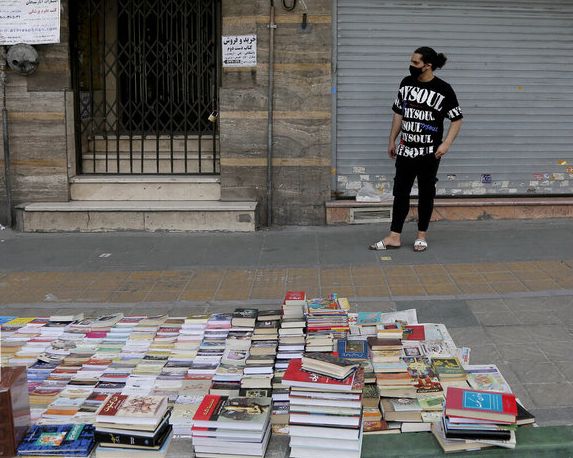
Sixty Iranian writers and poets have announced they will publish their works without submission to Islamic Republic censors until such time when censorship stops in Iran.
The announcement titled “We the literary” was published by a Canadian Iranian writer, Fereshteh Molavi, but it is signed by writers from Iran and the diaspora.
The clerical government in Iran requires all books, films and music be submitted for review be censors before publication or screening. Works by artists perceived to have dissident ideas usually get rejected and others are altered to fit the religious and political boundaries of the authoritarian regime. Some books have been in limbo for years, waiting for permission.
The signatories say, “We are regard democratic freedoms, especially freedom of thought and expression as well as freedom to write as our civil and citizenship rights.”
The writers also said that they pledge to undertake their share of duty “in building the Iran of tomorrow.”
More than three hundred Iranian translators in November joined other professional groups expressing their support for the ongoing protest movement against the Islamic Republic.
They announced that they will stand against all types of discrimination and prohibitions that have made life in Iran similar to “mere survival in forced labor camps.”
They also condemned the killing of civilians and children, saying like others in Iran and abroad they stand with “Woman, Life, Freedom” movement.